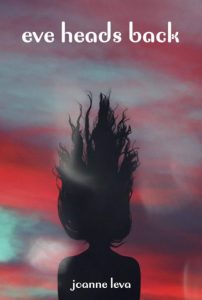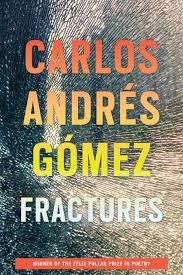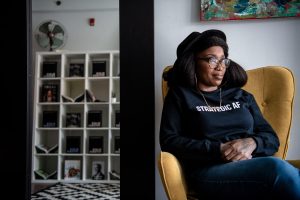
I knocked on my aunt’s door as insistently as my cold knuckles and army gloves would let me. The sound was pathetic and I’d be surprised if she could hear it. But just in case she could, I took a step back to wait.
This was the kind of cold that stabs through whatever you’re wearing, including skin, fat, and muscle. Newly-made blood cells were chinking off each other as they came out of my bone marrow already frozen. I pulled my overcoat tighter around myself, no mean feat considering the thickness of the sweater I was wearing, and buried my chin, mouth, and nose into my scarf.
I wasn’t wearing a hat, but I’d piled up a bunch of my hair on top of my head to imitate one. It didn’t really work. All it meant was loose strands caught the breeze and fluttered around my head, occasionally whipping at fresh snow.
“January fucking sucks.” The steam from my muffled voice puffed through the folds of my scarf. I rubbed my gloved hands together in a caricature of hypothermia. My brother mailed me these gloves from Vietnam. Apparently some bureaucratic fuck up issued his artillery battalion cold weather uniforms, despite Vietnam not having a winter worth mentioning. Pat made sure his sister came out ahead though and swiped me some gloves and socks. Thick wool and olive green. I was wearing the socks too.
I wanted a cigarette, but I didn’t want to deal with inarticulate wool fingers fumbling around in my coat pockets trying to find my pack and lighter. So I suffered.
I turned back to face my aunt’s house. It was a two storey row home of red brick that could probably stand up to nuclear war, despite being built forty years before that was something we had to worry about.
The first floor only had three rooms, the living room, dining room, and kitchen. Naturally, it’s where we spent most of our time. Listening to the radio, playing card and board games, cooking, backing, eating, and talking well past everyone should be asleep.
Upstairs was two bedrooms, so space for guests. But usually the guest space was for me and my five brothers and sisters when we needed to bail out of our own house. We’d all used it. I once stayed for two weeks.
It was why I was there now.
All in all, it was a respectable home for someone in her situation. Her situation being that of an unmarried woman. An unmarried woman on that side of forty. An unmarried immigrant woman on that side of forty.
I put my ear up to the door. I couldn’t hear anyone behind it.
“Fuck it.” I pulled the glove off my right hand, brought my balled up fist to my mouth, and breathed into it, trying to defrost them to the point where they could function. When I was satisfied I sent my half-feeling fingers into my overcoat pocket for my cigarettes. I took the pack out, shook it, caught a cigarette and put it between my lips. The pack went back in and out came the lighter, another surplus gift from my brother.
I flipped it open and flicked the flint. The flame kissed the front of the cigarette and I sucked. With a metallic snap, I shut the lighter and dropped it in my pocket. My hand wandered in after it and I thumbed the edges of the departing bus schedule folded in my pocket.
I’d picked it up after a particularly ugly debate with my parents. You’d think they wouldn’t take my political dissent so personally, but I guess when one of your sons is wrapped up in a war that looks like it won’t end before another one has to go over too, dissent gets sharply intimate.
I let out the smoke from my first drag slowly, trying to get it to catch in my scarf and hang around my head like a cloud. Instead, it was whipped up and whisked away by a sharp winter wind that stung my cheeks and threw snow in my face.
I don’t blame Pat for getting dragged overseas. I couldn’t even if I wanted to, he was drafted. And it goes without saying I wanted him home, safe and sound, as soon as he can make that happen.
But it’s well within my rights to parse out where my support begins and ends and it begins and ends with Pat. I’m not buying into the rest of it the way they have and I’m not going to stick around so that every single sit-down dinner devolves into a diatribe on threats both foreign and domestic.
I put the cigarette back in my mouth and figured I might as well try another knock now that it had been a little while and my glove was off.
Almost immediately, the door swung open and my aunt, Bridget Collins, appeared. She looked perpetually windswept, with wild gray curls and stinging red on her cheeks. At five-foot-ten, she had a good four inches on me. She was certainly wider. Her shoulders were used to work and constant movement. Coming to America had put a few pounds on her, but they added to her overall sense of resilience.
She looked me up and down with gray-green eyes, no smile or tension on her face. “Put that shit out.” She turned to go back in the house, leaving the door open for me to follow. “Nineteen years old, thinking she can suck down tar and fucking smoke and there’ll not be consequences for it.”
Even though she was laying out an early death for me, her voice made me smile. Hers was the music of a working class, west-Irish woman. Conviction was in plentiful supply and the edges came off when it was time for tenderness. It carried me along, soft and firm, insistent and pleasant.
I dropped the cigarette into the deepening snow and stepped across the threshold.
She was already in the kitchen, evidenced by utensils thunking and metal racks clanging. Making noise for noise’s sake.
Her voice curled through the house. “Wipe your shoes. They’re using too much salt on the street and it ruins my carpet.”
I dragged my boots across a bristled welcome mat, then sat on the chair just inside the door to unlace them. My breath fogged in front of me. “Bridget, it’s barely warmer in here than it is outside.”
“We’re at a generous 60 on the thermostat. Are you wearing my jumper?”
I glanced at my torso to confirm what I already knew. It was one of hers. A big, itchy, coarse thing, made for warmth in air that never fully dried. Definitely not style.
I couldn’t remember if she’d brought it with her when she followed my dad to America or if she’d knitted it herself. In either case, it hadn’t actually been given to me. I found it in her closet a few years ago and just took it. She never asked for it back, but she also always referred to it as “hers.”
“Yeah.”
“Then you’ll be fine. Come grab an apron.”
I put the boots back on the linoleum and walked to the dining room to hang my coat on one of the chairs. I took a moment to admire the decor.
It was a fairly simple room. The only furniture was a table, six accompanying chairs, and a buffet. All were solid wood.
On the buffet were a few keepsakes, mementos, and photographs. She had my dad’s war medals from his time in the Pacific, a letter my brother wrote her from Vietnam, and a couple photos of us kids at various holidays and events.
There were sketches too. An old stone archway, a fishing boat, and a handful of Celtic knots. One of a pub with an Irish name I couldn’t pronounce. They were snapshots of her childhood and adolescence in Galway, done by her own hand.
On the wall was her contribution to the watercolor medium. The sun was rising or setting, I couldn’t really tell. An orange-red sun spilled hazy light over a coastal city and its marine environs, both bathed in purple and pink. Smudges in suits, caps, and dresses filled the cobbled streets and watched fishing boats head into the bay.
Bridget’s voice jolted me back to her house. “Where the hell did you get to?”
“I’m coming, I’m coming.”
When I joined her in the kitchen, she was holding out an apron for me. I dropped the top loop over my head and bent my arms behind my back to tie the string.
“Let me.” She spun me around, pulled the strings around my waist, and tied them tight. She turned me back to face her and lit up with a smile. “Katherine. Hello.”
I always liked the way she said my name. Most other people I know put it through their fucking noses, but here she was, putting that music back into it.
Dad talks this way too, which you’d expect since they both came from the same place, but there’s a hell of a difference between listening to a paternal lecture and an aunt’s pleasantries.
She released me and turned back to the counter. “What’s on the menu, Bridget?”
“I was in the mood for scones.”
I injected some sarcasm into my voice. “Homesick?”
The answer came offhand. “Always.” Her eyes flicked from the mixing bowls on the counter to my sweater then back.
I felt blood rush to my cheeks and bent to look in the baking cabinet. Sacks of different kinds of flours, sugars, syrups, powders, and spices stared back at me. I pushed a few sacks from side to side, lifted brown sugar and white sugar, poked a bag of chocolate chips.
“Self-raising flour and caster sugar, Katie.” Her voice was level.
~
The crumbs of flour, sugar, and butter pushed between my fingers and through the creases in my palm. They combined, balled up, and fell out of my hand. Dry, greasy, unappetizing balls of grittiness that in no way indicated they’d eventually turn into the sweet, bready companion for a strong cup of tea.
Bridget was at my shoulder, watching me push the flour and butter together. She nodded her approval. “That’ll do us nicely.”
I took my hand out of the pile of crumbs and rubbed my fingers together, trying to get as much of the butter and flour as possible off my hands and into the bottom of the metal mixing bowl. When I was done, I went to the sink and turned on the hot water. I kept a finger under the water to monitor the temperature.
Bridget was giving me side-eyes as soon as I turned the tap handle. “I’d say that’s hot now, no?”
“If I try to wash my hands with this, all I’ll do is make another big pat of butter at the bottom of your sink. Nothing’s melting right now.”
“So you’ll dump half the fucking Brandywine down the drain?”
I sneered, hopefully playfully. “If that’s what it takes.”
The hint of a smile twitched at the corners of her mouth as she went to the fridge and pulled out eggs and milk. She put them on the counter next to my bowl full of crumbs. “One of these, then the milk until it looks wet enough.”
Warm water finally came from the tap, so I rubbed a bar of soap between my butter-greased fingers and got to work.
I felt eyes on the back of my neck, so I turned my head to peek over my shoulder.
Bridget was standing in the doorway, staring at me. The gears in her head looked to be turning. “Does your father know you’re here?”
“I’d say he’s safely assumed where I am.” I muttered the next part. “And why I’m here.”
If she heard my dig against her brother, Bridget didn’t let on. “Will you be spending the night?”
“Could I?”
“You’re always welcome here, I just need to know so I can make up the guest room. I washed the linens and they’re not on the bed.”
“I don’t want to put you out.”
“Not at all.”
“Thanks, Bridget.”
She went upstairs, still wearing her apron.
~
A ring of wet dairy clung to the sides of the bowl, refusing to be mixed into the rest of the batter. I dug the whisk deeper in and turned it like a spoon. I sped up, hoping the shock of having the metal cage back on them so quickly might scatter the grains.
“I don’t know what the fuck is wrong here.” I held the bowl out for her to inspect. “Maybe I put in too much milk.”
“It’s possible.” She took the bowl and whisk from me and mixed. The metal of the whisk gave a ringing scrape along the bottom of the bowl. “No. No. Just pockets of crumbs stuck on the bottom. Not quite mixed yet.”
I huffed.
“Don’t let it bother you.” Bridget smirked. “For time immemorial, bakers have been vexed by clumpy flour.”
I shrugged. “I’m better than this.”
“You are.” There wasn’t scolding in her response. Just a statement.
She turned her attention to the bowl.
Since I was ten or eleven, I’d been walking down and dropping on an apron to join the production line. I’ve made at least six different types of soda bread, another twelve breads that required yeast, and three more that had us pouring bottles of stout into the batter.
We’ve churned out biscuits, “biscuits,” muffins, barmbrack for Halloween, and virtually every birthday cake me and my siblings have ever wanted, along with a few we didn’t.
Small hand-held pastries pour out of this kitchen with the kind of regularity military commanders kill for and in numbers that could feed the Marines and Vietcong, with enough left over we could host tea for even our most casual acquaintances.
Some days, I saw more of Bridget’s kitchen than I did my own bedroom.
But for all the time I’d spent here and with everything I’d put in and taken out of the oven, I’d never actually watched my aunt work. So I did. I leaned back against the sink and watched her fix my careless mixing.
She pulled the whisk in firm, steady circles. When she wasn’t satisfied with that, she stabbed at the clumps with the foremost wire. The metal from the bowl and the whisk scraped and rang against each other to a slow beat that would shame a metronome.
It was an effortless thing. I knew she baked before she came here. Some bakery in the middle of Galway, at the intersection of an unmarked street and mislabeled lane. Long closed by now.
Her gaze left her kitchen, her house, her street, our city, our county, our state. Her eyes looked instead at something a few feet below her and three thousand miles to the northeast.
And she was singing. There weren’t notes. There was no tune. It was only breath, re-enacting a song she’d already sung.
“I must away now…”
I was an intruder. Out of place in the kitchen where I’d supplied armies of relatives and neighbors.
“This morning’s tempest, I have to cross…”
I shifted my weight from one foot to the other. The floor’s linoleum crackled against its aging adhesive.
“He knelt down gently upon a stone…”
I went to her glassware cabinet and clinked glasses against each other, some so hard I thought I might chip them.
“And more than near drenched…”
I took one from the cabinet and put it below the tap. Water rushed from the faucet.
“Until that long night was past and gone…”
The words left Bridget. As they did, she adjusted the bowl in the crook of her arm, stopped mixing, and turned her full attention to the batter.
I slurped my water.
Bridget looked up at me, smiled, and handed me the bowl. “We’re grand now, so.”
~
The two of us looked proudly down at a row of three-inch, raisin and chocolate circles, salvaged from heinous mixing and distraction.
Bridget handed me a brush, a fork, an egg, and a bowl. “You know what’s next.” She turned to heat the oven.
I cracked the egg into the bowl, beat it to a yellow foam, and dipped the brush. Anywhere I saw flour dust or dry dough, I dragged the brush. There were thirty-six in all and I treated each one as if it was going to a photoshoot for Julia Child, if she would ever deign to dignify Irish baking.
Bridget opened the front of the oven. “It’s bound to be hot enough by now. Stick them in there and set yourself a timer.”
The baking tray scraped along the rack and I clicked the timer to seventeen minutes.
On top of the stove, steam poured from a cast iron kettle I hadn’t seen or heard Bridget fill. She wrapped the handle in a towel and poured the water into a teapot. “We’ll have one while we wait?”
I knew better than to treat it as a genuine question.
She waved me away. “Go sit at the dining room table. I’ll drop it down to you.”
~
In the dining room, I stood in front of her watercolor. The scene was devoid of minute features, mostly due to the limitations of the medium, not Bridget’s talent. It didn’t matter. I filled in the details myself.
The women had gray-green eyes, just like Bridget. The men looked out through the blue gradients of my father, a dark navy that turned to ice closer to the pupil.
Some of the landlubbers had kempt mustaches and others were clean shaven, but the fishermen had red and brown beards that would catch the spray coming off the bow of their boats. Their shouted orders, jokes, and shanties carried between boats.
Women’s silver earrings, brand new purchases they were showcasing to friends and neighbors, caught the multicolored light. They emitted bashful laughs at compliments and pointed to jewelers’ storefronts.
It seemed like a cold day, whatever time it was, and the people’s cheeks were red and drying out. Wind rushed off green mountains and the calm bay water to whip across the gentry’s faces. Men held their hats against the wind, desperately trying to hide bad haircuts and bald spots, but women let their brown, black, gray, and red locks bounce in the gust.
I heard Bridget’s feet behind me, along with the sound of her fully stocked tea tray being placed on the table.
“You painted this, right?” I didn’t turn around as I asked.
“I did, aye.” She stood up and went back into the kitchen. I could tell from the noise that she was rummaging through her liquor cabinet. She came back in with a half-empty bottle of whiskey and dropped it on the table. “Would you sit down? You’re making me nervous, putting all that stress on your knees.”
I picked the seat catty corner from her, the one with my overcoat hanging off the back.
She held my eyes for a moment and I got the sense she was calculating.
She poured a healthy measure of whiskey into both of our cups. “Don’t tell your father. He’s bought into the drinking age here for some reason. I suspect it’s because he has American kids.”
I added milk and sugar and stirred both into the tea and whiskey and jerked my head toward the watercolor. “Have you told me what it is?”
“If you’re asking that, probably not.”
There was a long pause. There was the clink of metal on porcelain as she scooped sugar from its dish.
Impatience got the better of me. “Well?”
She stirred in her milk and sugar. “Not much to tell. I woke up too early one day. There was no going back to sleep — believe me, I tried — so I threw something on and headed out. That jumper, actually, if memory serves. That’s what I saw that morning.”
I fingered a few of the gaps between the yarn of my sweater. “Short shrift for something that you clearly spent so long on.”
She smiled, sighed, and changed the subject. “Your brother sent me a picture.”
“Oh, lemme see.” I held out an expectant hand.
She went to a pile of mail on the buffet. “Apparently some journalist popped round with one of those cameras. You know, where you take the picture and it comes out and develops as you shake it. He had a regular camera, too, like. But that was for the papers. The instant was for anyone who wanted to send something home.”
“It’s a good thought.”
“I’m inclined to agree. Here it is. Right on top.” She took the picture from its envelope and handed it to me.
My breath caught. My oldest brother, Pat, was leaning on 155mm Howitzer like it was the wicker furniture on our front porch. There were sandbags and guard towers and bunkers visible in the background, and jungle hills behind that, but those barely registered. I could only see my brother.
He hadn’t wanted to go in the first place, but when they called his number, there he went. Now here was a pale Polaroid facsimile of the man we sent away.
He was smiling, but it was a begrudging smile, at ease in spite of himself. He wasn’t necessarily having a bad time, but it certainly wasn’t the way he wanted to spend his mid-twenties. There was a cigarette in his mouth and his red hair was shorter than I’d ever seen it. His shirt was unbuttoned almost halfway down his torso and his sleeves were rolled up past his elbows. Dog tags glinted against his bare chest.
I flipped the picture over and found my real brother. On the back was his chicken-scratch, recognizable immediately, immediately frustrating. “Vietnam is lovely this time of year. A bit noisy. I hope you’re well, Aunt Bridget.” There was a line break, then under it, in parentheses, “You too, Katherine.”
I sat back in my chair and blinked tears from my eyes. I dragged one hand across my nose. With the other, I pushed hair off my forehead and behind my ear.
“Six months. It feels longer.”
She took the picture back and looked at it, pride written in bold letters across her face. “It always does.”
She traded the picture for the whiskey bottle and swigged directly, then offered it to me.
I took it. “Sláinte.”
“You listen to me sometimes.”
“When you’re being interesting.”
I put the bottle back halfway between us.
Bridget had a face on her similar to when she was mixing in the kitchen, and she was tapping her spoon against the table. Her voice lapsed into an odd sentimentality I’d never heard. “I think one of the things I miss most about home is when the winter rain finally breaks.”
She laid the spoon flat and picked up the teacup. “You kids, and this is nothing against you, but you kids don’t seem to appreciate the kind of sun you get here. Even on the coldest winter day, you might still see the sun. The sun’s a bit sarcastic about it, I’ll grant you that, because the day will still freeze boiling water. So it’s not so pleasant, but at least the sun is out. At home, you might as well replace the sky with a thick fucking blanket of damp and wind between the months of October and March. Throw on your wool everything, because this is the way we’re living for the winter. Indoors at home or sprinting to the pub or indoors after sprinting to the pub. If you have a job, you’ll go there for the day, but eventually you have to leave and face the rain and there it is again.”
She put her empty cup back on the table. “It was February and it was cold. Not cold like here, but home’s humid cold. So I threw on that jumper and went outside and I’m glad I did because it started raining later and fuck did it keep going.”
She looked up at the painting for the first time since she came in the room.
“But everyone was out that morning. Like we had an alarm clock set for the only sunrise that would be worth watching. And we went down to watch the fishermen go out from the Claddagh, all of us pretending the winter wasn’t going to punish us for it later.”
She poured two fresh cups of improvised toddies. As she did, she examined every available inch of my face. She even ventured down to my shoulders to see if the slope or lack thereof would tell her something.
Evidently it didn’t, because she reached into the apron she was still wearing and pulled out the Greyhound bus schedule that was previously in my coat pocket. She slid it in front of me. “Big plans?”
Instinct took over and I threw my hand into the coat pocket. It was empty. “I was brainstorming.”
“This is more than throwing spaghetti at the wall to see what sticks.”
I paused. I had to.
Bridget kept probing. “Is there a destination in mind? The wild west is written all over this schedule, but there’s nothing final.”
“San Francisco. I have the ticket already. One way.”
I nodded.
“Any particular reason?”
“It’s always warm. I like hills. I think the lifestyle might agree with me.”
“I think it might too.”
My eyes snapped to hers. “What?”
“From what I’ve heard about the place, it’d suit you. Young people, war protests, female liberation, flowers. They seem like things you’d like.”
My voice fell to almost a whisper. “Dad’s not there.”
With a barking laugh and a nod, Bridget said, “You’ll miss that one day. But not while you’re young.”
We both took another swig from the whiskey bottle.
“You asked me if I was homesick. I know I’m American now, with the immigration and naturalization and citizenship and voting and true-blue all that. And I love this house. I love this city. I love what I found here.” She reached across and squeezed my hand to emphasize the point.
A flash of guilt crossed her face. “But those pink and purple and orange and red sunrises, mornings you can’t get here, never go away. They don’t. They just don’t.”
She looked at me and I stared at our joined hands.
After long seconds, she released me. “When will you go?”
My voice betrayed me as it shook. “Two days.”
She nodded. “Do your parents know? Does your father know?”
“It hasn’t come up.”
She didn’t say anything for a minute. When she finally did, we were finishing a conversation she’d been on the receiving end of decades ago. We were standing on a wharf in the west of Ireland. A suitcase with enough fresh baked scones to take me across the Atlantic sat next to my feet and we were watching deckhands extend a gangplank down to a waiting crowd.
Bridget saw me off. “We’ll be here when you get back. However long you’re gone, however long you need to stay away, we’ll be here when it’s over.”
Dillon is from Wilmington, Delaware. His fiction has previously appeared in Caesura Literary Magazine, The Main Street Journal, and The Broadkill Review in the United States, and The Galway Review and Ropes Literary Journal in Ireland. Most recently, he had poetry appear in Vox Galvia in Galway. He also completed his MA in Writing at NUI Galway in Ireland.









